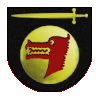Translating a dream
In my quest to understand the virtues of chivalry, I ran acoss Count Sir Garick von Kopke's page, "Of the Vertues that Apperteyne to Chyvalry". At the top, Count Garick quotes Raymon Lull from his 13th century work Libre del Orde de Cauayleria.
I am not a student of Old English, but this quote was like something uttered in a dream. I could understand so much of it, and yet there were words that made no sense. I felt it was worth my time to translate it into something that more easily flows through my modern English thinking mind. In doing so, I found that Lull's words are not just a laundry list of virtues. They are a statement of how a knight should BE, as opposed to ACT. None of this is a scholarly undertaking, as much as it is my search for meaning. As such, take this with whatever measure of salt you think is appropriate.
In my search for terms, I also found that (surprise) other's had also translated this quote. I did my best to not read their translations. I wanted to see what I could glean from the original text, as opposed to just regurgitating someone else's findings. Here is Lord Erec's translation, along with a quoting of Robert Adam's translation.
Raymond Lull
“Knigts ougt to take coursers to juste & to go to tornoyes / to holde open table / to hu(n)te at hertes / at bores & other wyld bestes / For in doynge these thynges the knygtes exercyse them to armes / for to mayntene thordre of knigthode Thene to mesprise & to leue (th)e custom of (th)t which (th)e knygt is most apparailled to vse his office is but despising of thordre / & thus as al these thynges afore said appertyne to a knygt as touching his body / in lyke wise justice / wysedom / charite (/) loyalte / verite / humylite / strength / hope swiftness & al other vertues se(m)blable appertyne to a knygt as touchyng his soule / & therfor the knygt that vseth the thynges (th)t apperteyne to thordre of chyualry as touchyng his body / & hath none of these vertues that apperteyne to chyualry touchyng his soule is not the frende of thordre of knygthode.”
My translation
Knights ought to take horses to joust and go to tourneys, hunt wild beasts, feast and be social to all. Doing these things maintains a knight's skills. To be a knight but scorn and leave the customs of knightood when acting as a knight is to dispise the order.
As the afore mentioned things pretain to the knight's body. Likewise justice, wisdom, charity, loyalty, verity, humility, strength, hope, swiftness and all other virtues pretrain to a knight's soul.
And therfore a knight that does the things that pretain to the order of chivalry, but has none of the virtues of chivalry touching his soul is not a friend of the order of knighthood.
Step by step transitions
In the following triplets, the frist paragraph is Lull's original statement. The second is my fairly straight forward translation without looking up any words. The third is my translation with what I believe are appropriate tranlations between old English words and modern words.
Knigts ougt to take coursers to juste & to go to tornoyes / to holde open table / to hu(n)te at hertes / at bores & other wyld bestes /
Knight ought to take coursers to joust & to got to tourneys; to hold open table; to hunt at harts and boars & other wild beasts.
Knights ought to take horses to joust and go to tourneys, hunt wild beasts, feast and be social to all.
For in doynge these thynges the knygtes exercyse them to armes
For in doing these things the knights exercise them to arms.
Doing these things maintains the knights skills
for to mayntene thordre of knigthode Thene to mesprise & to leue (th)e custom of (th)t which (th)e knygt is most apparailled to vse his office is but despising of thordre
For to maintain the order of knighthood then to scorn & to leave the custom of that which the knight is most appareled to use his office is but despising of the order.
To be a knight but scorn and leave the customs of knightood when acting as a knight is to dispise the order.
& thus as al these thynges afore said appertyne to a knygt as touching his body / in lyke wise justice / wysedom / charite (/) loyalte / verite / humylite / strength / hope swiftness & al other vertues se(m)blable appertyne to a knygt as touchyng his soule
And thus as all these thinges afor said appertyne to a knight as touching his body in like wise justice, wysdom, charity, loyualty, verity, humility, strength, hope, swiftness and all other vertues semblable appertyne to a knight as touching his soul
As the afore mentioned things pretain to the knights body. Likewise justice, wisdom, charity, loyalty, verity, humility, strength, hope, swiftness and all other virtues pretrain to a knight's soul.
& therfor the knygt that vseth the thynges (th)t apperteyne to thordre of chyualry as touchyng his body / & hath none of these vertues that apperteyne to chyualry touchyng his soule is not the frende of thordre of knygthode.
and therefore the knight that uses the things that appertyne to the order of chivalry as touching his body and has non of these virtues that apperteyne to chivalry touching his sould isnot the friend of the order of knightood.
And therfore a knight that does the things that pretain to the order of chivalry, but has none of the virtues of chivalry touching his soul is not a friend of the order of knighthood.
